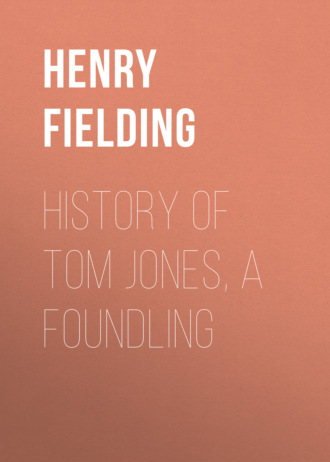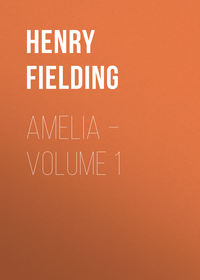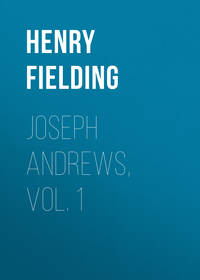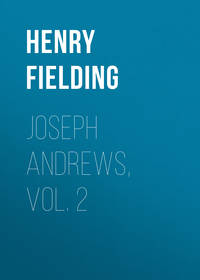 полная версия
полная версияHistory of Tom Jones, a Foundling
Sophia had earnestly desired her father that no others of the company, who were that day to dine with him, should be acquainted with her marriage. The same secrecy was enjoined to Mrs Miller, and Jones undertook for Allworthy. This somewhat reconciled the delicacy of Sophia to the public entertainment which, in compliance with her father’s will, she was obliged to go to, greatly against her own inclinations. In confidence of this secrecy she went through the day pretty well, till the squire, who was now advanced into the second bottle, could contain his joy no longer, but, filling out a bumper, drank a health to the bride. The health was immediately pledged by all present, to the great confusion of our poor blushing Sophia, and the great concern of Jones upon her account. To say truth, there was not a person present made wiser by this discovery; for Mrs Miller had whispered it to her daughter, her daughter to her husband, her husband to his sister, and she to all the rest.
Sophia now took the first opportunity of withdrawing with the ladies, and the squire sat in to his cups, in which he was, by degrees, deserted by all the company except the uncle of young Nightingale, who loved his bottle as well as Western himself. These two, therefore, sat stoutly to it during the whole evening, and long after that happy hour which had surrendered the charming Sophia to the eager arms of her enraptured Jones.
Thus, reader, we have at length brought our history to a conclusion, in which, to our great pleasure, though contrary, perhaps, to thy expectation, Mr Jones appears to be the happiest of all humankind; for what happiness this world affords equal to the possession of such a woman as Sophia, I sincerely own I have never yet discovered.
As to the other persons who have made any considerable figure in this history, as some may desire to know a little more concerning them, we will proceed, in as few words as possible, to satisfy their curiosity.
Allworthy hath never yet been prevailed upon to see Blifil, but he hath yielded to the importunity of Jones, backed by Sophia, to settle £200 a-year upon him; to which Jones hath privately added a third. Upon this income he lives in one of the northern counties, about 200 miles distant from London, and lays up £200 a-year out of it, in order to purchase a seat in the next parliament from a neighbouring borough, which he has bargained for with an attourney there. He is also lately turned Methodist, in hopes of marrying a very rich widow of that sect, whose estate lies in that part of the kingdom.
Square died soon after he writ the before-mentioned letter; and as to Thwackum, he continues at his vicarage. He hath made many fruitless attempts to regain the confidence of Allworthy, or to ingratiate himself with Jones, both of whom he flatters to their faces, and abuses behind their backs. But in his stead, Mr Allworthy hath lately taken Mr Abraham Adams into his house, of whom Sophia is grown immoderately fond, and declares he shall have the tuition of her children.
Mrs Fitzpatrick is separated from her husband, and retains the little remains of her fortune. She lives in reputation at the polite end of the town, and is so good an economist, that she spends three times the income of her fortune, without running into debt. She maintains a perfect intimacy with the lady of the Irish peer; and in acts of friendship to her repays all obligations she owes her husband.
Mrs Western was soon reconciled to her niece Sophia, and hath spent two months together with her in the country. Lady Bellaston made the latter a formal visit at her return to town, where she behaved to Jones as a perfect stranger, and, with great civility, wished him joy on his marriage.
Mr Nightingale hath purchased an estate for his son in the neighbourhood of Jones, where the young gentleman, his lady, Mrs Miller, and her little daughter reside, and the most agreeable intercourse subsists between the two families.
As to those of lower account, Mrs Waters returned into the country, had a pension of £60 a-year settled upon her by Mr Allworthy, and is married to Parson Supple, on whom, at the instance of Sophia, Western hath bestowed a considerable living.
Black George, hearing the discovery that had been made, ran away, and was never since heard of; and Jones bestowed the money on his family, but not in equal proportions, for Molly had much the greatest share.
As for Partridge, Jones hath settled £50 a-year on him; and he hath again set up a school, in which he meets with much better encouragement than formerly, and there is now a treaty of marriage on foot between him and Miss Molly Seagrim, which, through the mediation of Sophia, is likely to take effect.
We now return to take leave of Mr Jones and Sophia, who, within two days after their marriage, attended Mr Western and Mr Allworthy into the country. Western hath resigned his family seat, and the greater part of his estate, to his son-in-law, and hath retired to a lesser house of his in another part of the country, which is better for hunting. Indeed, he is often as a visitant with Mr Jones, who, as well as his daughter, hath an infinite delight in doing everything in their power to please him. And this desire of theirs is attended with such success, that the old gentleman declares he was never happy in his life till now. He hath here a parlour and ante-chamber to himself, where he gets drunk with whom he pleases: and his daughter is still as ready as formerly to play to him whenever he desires it; for Jones hath assured her that, as, next to pleasing her, one of his highest satisfactions is to contribute to the happiness of the old man; so, the great duty which she expresses and performs to her father, renders her almost equally dear to him with the love which she bestows on himself.
Sophia hath already produced him two fine children, a boy and a girl, of whom the old gentleman is so fond, that he spends much of his time in the nursery, where he declares the tattling of his little grand-daughter, who is above a year and a half old, is sweeter music than the finest cry of dogs in England.
Allworthy was likewise greatly liberal to Jones on the marriage, and hath omitted no instance of shewing his affection to him and his lady, who love him as a father. Whatever in the nature of Jones had a tendency to vice, has been corrected by continual conversation with this good man, and by his union with the lovely and virtuous Sophia. He hath also, by reflection on his past follies, acquired a discretion and prudence very uncommon in one of his lively parts.
To conclude, as there are not to be found a worthier man and woman, than this fond couple, so neither can any be imagined more happy. They preserve the purest and tenderest affection for each other, an affection daily encreased and confirmed by mutual endearments and mutual esteem. Nor is their conduct towards their relations and friends less amiable than towards one another. And such is their condescension, their indulgence, and their beneficence to those below them, that there is not a neighbour, a tenant, or a servant, who doth not most gratefully bless the day when Mr Jones was married to his Sophia.
FINIS1
Whenever this word occurs in our writings, it intends persons without virtue or sense, in all stations; and many of the highest rank are often meant by it.
2
The English reader will not find this in the poem; for the sentiment is entirely left out in the translation.
3
This is the second person of low condition whom we have recorded in this history to have sprung from the clergy. It is to be hoped such instances will, in future ages, when some provision is made for the families of the inferior clergy, appear stranger than they can be thought at present.
4
“What modesty or measure can set bounds to our desire of so dear a friend?” The word desiderium here cannot be easily translated.
It includes our desire of enjoying our friend again, and the grief which attends that desire.
5
This is an ambiguous phrase, and may mean either a forest well cloathed with wood, or well stript of it.
6
The reader may, perhaps, subdue his own patience, if he searches for this in Milton.
7
The Deity.
8
By this word here, and in most other parts of our work, we mean every reader in the world.
9
It is happy for M. Dacier that he was not an Irishman.
10
Firm in himself, who on himself relies,Polish’d and round, who runs his proper courseAnd breaks misfortunes with superior force. – MR FRANCIS.11
The rest of this paragraph and the two following paragraphs in the first edition were as follows:
“For my own part, I had been for some time very seriously affected with the danger to which the Protestant religion was so visibly exposed, that nothing but the immediate interposition of Providence seemed capable of preserving it; for King James had indeed declared war against the Protestant cause. He had brought known papists into the army and attempted to bring them into the Church and into the University. Popish priests swarmed through the nation, appeared publicly in their habits, and boasted that they should shortly walk in procession through the streets. Our own clergy were forbid to preach against popery, and bishops were ordered to supend those who did; and to do the business at once an illegal ecclesiastical commission was erected, little inferior to an inquisition, of which, probably, it was intended to be the ringleader. Thus, as our duty to the king can never be called more than our second duty, he had discharged us from this by making it incompatible with our preserving the first, which is surely to heaven. Besides this, he had dissolved his subjects from their allegiance by breaking his Coronation Oath, to which their allegiance is annexed; for he had imprisoned bishops because they would not give up their religion, and turned out judges because they would not absolutely surrender the law into his hands; nay, he seized this himself, and when he claimed a dispensing power, he declared himself, in fact, as absolute as any tyrant ever was or can be. I have recapitulated these matters in full lest some of them should have been omitted in history; and I think nothing less than such provocations as I have here mentioned, nothing less than certain and imminent danger to their religion and liberties, can justify or even mitigate the dreadful sin of rebellion in any people.” “I promise you, sir,” says Jones, “all these facts, and more, I have read in history, but I will tell you a fact which is not yet recorded and of which I suppose you are ignorant. There is actually now a rebellion on foot in this kingdom in favour of the son of that very King James, a professed papist, more bigoted, if possible, than his father, and this carried on by Protestants against a king who hath never in one single instance made the least invasion on our liberties.” “Prodigious indeed!” answered the stranger. “You tell me what would be incredible of a nation which did not deserve the character that Virgil gives of a woman, varium et mutabile semper. Surely this is to be unworthy of the care which Providence seems to have taken of us in the preservation of our religion against the powerful designs and constant machinations of Popery, a preservation so strange and unaccountable that I almost think we may appeal to it as to a miracle for the proof of its holiness. Prodigious indeed! A Protestant rebellion in favour of a popish prince! The folly of mankind is as wonderful as their knavery – But to conclude my story:
I resolved to take arms in defence of my country, of my religion, and my liberty, and Mr. Watson joined in the same resolution. We soon provided ourselves with an necessaries and joined the Duke at Bridgewater.” “The unfortunate event of this enterprise you are perhaps better acquainted with than myself. I escaped together with Mr. Watson from the battle at Sedgemore…
12
the rest of this paragraph is omitted in the third edition
13
– Each desperate blockhead dares to write:
Verse is the trade of every living wight. – FRANCIS
14
There is a peculiar propriety in mentioning this great actor, and these two most justly celebrated actresses, in this place, as they have all formed themselves on the study of nature only, and not on the imitation of their predecessors. Hence they have been able to excel all who have gone before them; a degree of merit which the servile herd of imitators can never possibly arrive at.
15
This word, which the serjeant unhappily mistook for an affront, is a term in logic, and means that the conclusion does not follow from the premises.
16
Whose vices are not allayed with a single virtue
17
A celebrated mantua-maker in the Strand, famous for setting offthe shapes of women.
18
Possibly Circassian.
19
This was the village where Jones met the Quaker.
20
Place me where never summer breezeUnbinds the glebe, or warms the trees:Where ever-lowering clouds appear,And angry Jove deforms th’ inclement year.Place me beneath the burning ray,Where rolls the rapid car of day;Love and the nymph shall charm my toils,The nymph who sweetly speaks, and sweetly smiles.MR FRANCIS.21
See the 2d Odyssey, ver. 175.
22
Lest posterity should be puzzled by this epithet, I think proper to explain it by an advertisement which was published Feb. 1, 1747.
N.B. – Mr Broughton proposes, with proper assistance, to open an academy at his house in the Haymarket, for the instruction of those who are willing to be initiated in the mystery of boxing: where the whole theory and practice of that truly British art, with all the various stops, blows, cross-buttocks, &c., incident to combatants, will be fully taught and explained; and that persons of quality and distinction may not be deterred from entering into A course of those lectures, they will be given with the utmost tenderness and regard to the delicacy of the frame and constitution of the pupil, for which reason muffles are provided, that will effectually secure them from the inconveniency of black eyes, broken jaws, and bloody noses.
23
Meaning, perhaps, the bank-bill for £100.
24
This is a fact which I knew happen to a poor clergyman in Dorsetshire, by the villany of an attorney who, not contented with the exorbitant costs to which the poor man was put by a single action, brought afterwards another action on the judgment, as it was called. A method frequently used to oppress the poor, and bring money into the pockets of attorneys, to the great scandal of the law, of the nation, of Christianity, and even of human nature itself.









